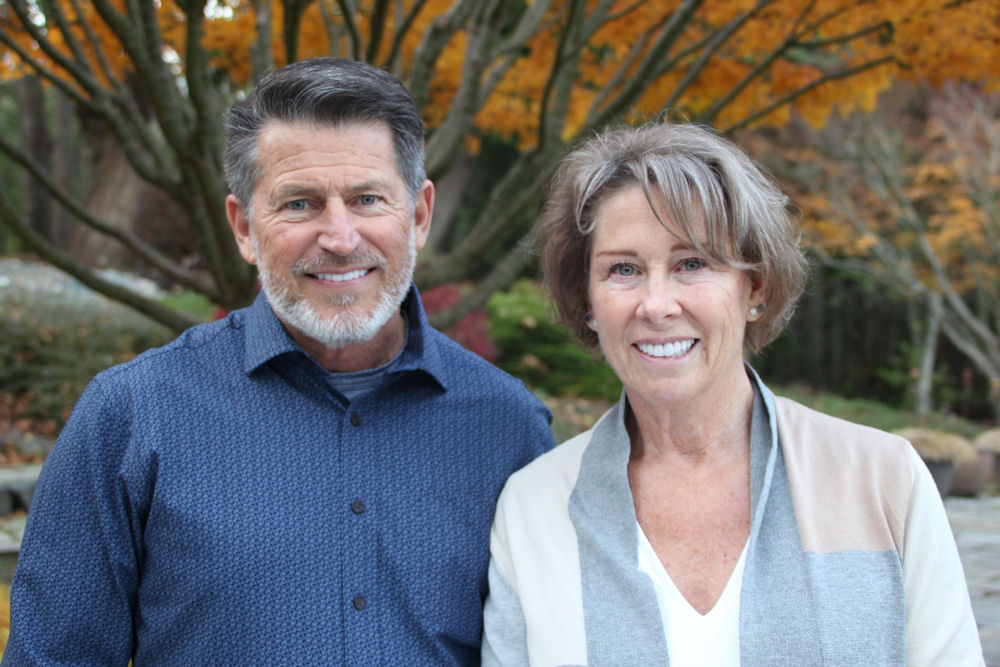First Steps Recovery is proud to partner with Scott and Jenny Graham to offer an insightful Family Program to support the families of those in recovery from addiction. Scott and Jenny Graham have facilitated family programs, interventions, and transports across the United States and Canada since 1988. They are both in recovery and are seasoned and trusted interventionists, keynote speakers, radio guests, and authors with an unparalleled reputation in the treatment field.
With over three decades of experience, Scott and Jenny have helped thousands of families like yours overcome the obstacles they faced, with a success rate greater than 90 percent. They have done this by providing support, safety, and guidance before, during, and after interventions, transports, and family programs.
Scott is a Certified Substance Use Disorder Professional, and Scott and Jenny are Certified Counselors. As an adjunct college-level instructor, Scott taught drug and alcohol counselor certification courses. Scott worked as a counselor in both inpatient and outpatient treatment and has a private practice. In addition to teaching and counseling, Scott has worked as a program director in chemical dependency treatment. Scott and Jenny have worked in the public school system as Intervention Specialists at the middle and high school levels. They have been privileged to be trainers for “The Recovery Foundation” and “Living Works,” the most prominent global training organization for Suicide Intervention.
Before Scott’s work in this field, he was an undercover vice/narcotics deputy in the West Hollywood area for the Los Angeles County Sheriff’s Department. West Hollywood had the highest crime rate area per capita in all of Los Angeles County during that time. That experience, without a doubt, has added a unique perspective to the varied dynamics encountered in their intervention work.
Independently and objectively, they receive referrals from outpatient and inpatient programs, hospitals, public schools, churches, county and state agencies, Tribal governments, therapists, private and public, and federal organizations throughout the US, including SAMHSA and NEDA.

Here is an example of an agenda for the two-day Family Program:
Day One
Clients and visitors are together
A Five-Part Formula for Recovery
Clients and visitors are in separate sessions for the remainder of Day One.
Day Two
Clients and visitors are together
2024
2025
By incorporating family members into the drug and alcohol addiction treatment process, a family program helps break the cycle of codependency and enables families to establish healthier personal boundaries. Participants learn about the stages of recovery, as well as codependency and other pitfalls of supporting their family member through addiction. This empowers them to better support their loved ones while also taking care of their own emotional well-being. Our residential inpatient treatment program California includes structured family programs designed to provide guidance, education, and support for both clients and their families throughout the recovery journey. Additionally, our outpatient program offers ongoing support for clients who need flexible treatment options while maintaining their daily responsibilities, ensuring that families can continue fostering a healthy and supportive environment even after residential care.
These tools not only assist in managing immediate challenges but also contribute to the overall resilience of the family, fostering a supportive environment that encourages recovery and growth. Progress is better supported by the family if there are set boundaries and a healthier dynamic overall.
Often, loved ones experience emotional distress and may struggle to cope with the changes in behavior and responsibilities brought on by the addiction. The stigma associated with addiction can lead to isolation, making it difficult for families to seek help. Financial strain, legal issues, and overall instability are common issues that arise, creating an environment steeped in stress. It’s crucial for families to recognize that they are not alone and that support is available to help navigate these tumultuous waters.
The impact of addiction can ripple through various aspects of family life, affecting not just immediate relationships but also extended family dynamics. Grandparents, aunts, uncles, and even close friends may feel the strain, as they grapple with their feelings of helplessness and concern.
Children in particular may bear the brunt of this turmoil, often feeling neglected or confused about the changes in their home environment. They may struggle with feelings of shame or embarrassment, leading to difficulties in social interactions and academic performance. In many cases, families may find themselves caught in a cycle of enabling behaviors, where they inadvertently support the addiction by shielding the individual from the consequences of their actions. This can create a toxic environment that perpetuates the cycle of addiction, making it even more challenging for the affected individual to seek help.
Participating in a family program for addiction yields multiple benefits for families, which can include:
Firstly, it provides a safe space for family members to express their feelings and share their experiences without judgment. This open dialogue can significantly alleviate feelings of isolation. In many cases, family members may feel alone in their struggles, believing that no one else can understand their pain or frustration. However, this open communication allows them to confront the impact of the addiction on the entire family, which can greatly contribute to the addicted person’s recovery.
One of the primary goals of family programs is to enhance communication skills. Families often learn how to articulate their thoughts and feelings more clearly, fostering a healthier dialogue. This improvement in communication can lead to more effective conflict resolution and a deeper understanding of each other’s perspectives, which is crucial in navigating the complexities of addiction.
Gaining knowledge about addiction can empower families. Understanding the psychological and physiological aspects of addiction allows family members to support their loved ones more effectively. This education can demystify the substance abuse recovery process, helping families to recognize that addiction is a disease, and how family support can make an enormous difference in recovery. This can shift the dynamics of blame and resentment.
Families can learn coping mechanisms to manage their stress and challenges effectively during a family program for addiction. These strategies are valuable not only during the recovery process but also in other life situations. Techniques such as mindfulness, stress management, and healthy communication can enhance overall family resilience, equipping them to handle future challenges more adeptly.
Overall, a family program for addiction helps cultivate a supportive environment that empowers families to tackle addiction collaboratively while tailored to each family’s unique needs. Our family program at First Steps Recovery is designed to promote sharing about the family dynamic within addiction and how it can affect each family member. By engaging in these shared experiences, families can reinforce their bonds and become more of a team in healing from drug and alcohol abuse.

A family program provides a safe space for participants to express their feelings and experiences without fear of judgment. This can be particularly crucial for children and adolescents, who may struggle to articulate their emotions regarding a parent’s or sibling’s addiction. They may feel pressure to conform to a certain narrative in their family about the addiction and may benefit from sharing in a more neutral environment. By fostering open communication, these programs help families develop healthier dynamics and improve their overall emotional well-being. Participants learn to recognize the signs of addiction, enabling them to respond more effectively and compassionately to their loved ones in need.
The educational aspect of family programs cannot be overstated. Family members who have no experience with drug addiction (or may see substance use with a particular bias) may benefit from learning more about how addiction works. This knowledge empowers family members to become advocates for their loved ones, guiding them toward appropriate treatment options and supporting their recovery journey.
By gaining insights into the addiction triggers and challenges associated with addiction, understanding substance abuse treatment options empowers families to guide their loved ones toward appropriate interventions and support their recovery journey. Families can work together to create a more nurturing environment that fosters healing and resilience. The family program for addiction at First Steps Recovery focuses this process into a two-day session, allowing for education and communication in a structured environment based on support.
Family therapy is a cornerstone of addiction recovery, involving the entire family in the healing process. This therapeutic approach helps family members understand the complexities of addiction, their role in the recovery process, and how best to support their loved ones. Family therapy can be conducted in various formats, including individual sessions, group sessions, or a combination of both, depending on the family’s needs.
These sessions provide a structured environment where family members can express their feelings, learn about addiction, and develop strategies to support their loved ones. By addressing the family dynamics that may contribute to the addiction, family therapy helps to create a more supportive and understanding home environment. This holistic approach not only aids the individual in recovery but also strengthens the entire family unit.
The primary goals of family therapy for addiction recovery include:
By focusing on these goals, family therapy plays a crucial role in the treatment and recovery process, helping families to navigate the challenges of addiction and emerge stronger and more united.

Family members play a pivotal role in the addiction recovery process. Their emotional support, encouragement, and motivation can be crucial in helping the individual stay committed to their recovery journey. By being actively involved, family members can provide a stable and nurturing environment that fosters healing and growth.
Effective communication is essential. By understanding the recovery process and their role within it, family members can become powerful allies in their loved one’s journey towards sobriety.
At First Steps Recovery, the Family Program is structured to facilitate healing in a compassionate and supportive setting. In addition to family systems therapy, our two-day program is designed to provide support to the families of those going through addiction. Drawing from evidence-based practices, the program aims to help families understand the complexities of addiction while rebuilding trust.
Family members aged 14 years and older are welcome to participate in this program to help support their family members healing from addiction. Contact us today to learn more.

From our certified therapists and nurses to our emotional support animal "Cooper", our entire team is dedicated to the health and success of our clients throughout our program and beyond.
Have questions about how our treatment programs works? Contact us today.
First Steps Recovery Treatment Programs and Expected Timelines
*Contingent on substances that are abused.
*Contingent on substances that are abused.
*Extended support services outpatient including psychiatry, family support therapy, couples therapy, individual therapy, group therapy, biofeedback, and TMS are available through our counseling and psychiatry institute in Fresno.
Dayatra L.
Melissa B.
Bruce G.
Have questions about how our alumni program works? Let's talk.










Have questions about First Steps Recovery? We're here to help.
© Copyright 2023 • First Steps Recovery • All Rights Reserved